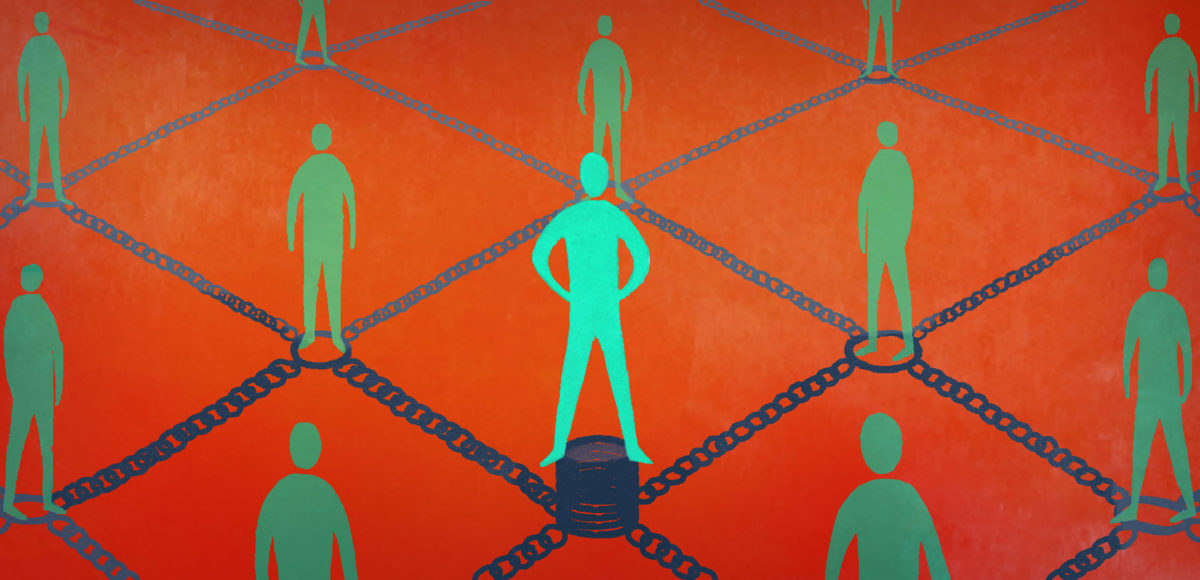by Sven Wagenknecht
Blockchain technology has revived an old discourse: Decentralized vs. Central. Blockchain technology has created a technological concept that enables global decentralized interaction that was previously impossible to represent in this way. With Bitcoin as a pioneering application, a counter-project to the central bank system was created 10 years ago. Supporters of this decentralized crypto-money system regard decentralized control as superior to centralized control by intermediaries such as banks and public institutions.
The decentralized interaction and order logic of the blockchain is not limited to financial transactions. Its application potential can be extended to all areas of life and business. Wherever we exchange data and transactions take place, whether on Facebook or at the citizens’ office, there are central intermediaries that collect, verify and, if necessary, monetize this data.
Decentralization is not an end in itself
In order to break through the perversions of the platform economy, the motto is often proclaimed: decentralize everything. Some blockchain proponents thus create an undifferentiated black-and-white image that places decentralized structures above central structures – on principle, not on the basis of argumentation. The narrative is strongly reminiscent of the classic children’s book Robin Hood: it is taken from the rich (Internet platforms) and returned to the poor (users). Instead of money, it is primarily data that we give daily to the data kraken that is at stake.
Given the enormous power that these giants of the platform economy possess, scandals like Cambridge Analytica, and the ultimately increasingly important role of data in the 21st century, it is therefore natural to analyze blockchain technology more closely. However, the promising technology must not degenerate into an ideology that prevents constructive discussions from taking place.
Instead of redirecting the entire data exchange to blockchain protocols, one should rather consider where decentralization makes sense and where it does not. The standards that determine the success or failure of a decentralized alternative are just as subject to market forces as any other technology or central organizational structure. Without a convincing user experience with economic added value and regulatory-political agreement, there will be no adaptation of blockchain protocols.
Decentrality is not absolute
In this context it is also often forgotten that decentralization is not an absolute state. Rather, it is a question of approximation or a relative tendency. Even the most decentralized blockchain application, Bitcoin, is only partially decentralized and has clear centralization tendencies. After all, only a handful of giant mining companies in China are prospecting the majority of all blocks or Bitcoins. At Bitcoin, too, a lot of power is distributed in a few hands.
Because a decentralised network cannot be operated for free, it needs economic incentives. It therefore needs players who contribute to the processing of decentralised transactions. Idealism is certainly only a drop in the ocean here. As a result, there is economic competition for the incentives offered by a decentralised network. In the end, market forces decide which actors can profitably participate in the decentralised network. Exactly this basic economic principle leads in the long run to a concentration on a few large players, ergo centralistic structures. Only the strongest and largest market participants can achieve a surplus return in the market in the long run and thus displace the smaller and weaker players in the long run. Accordingly, we must ask the question: Who really benefits from blockchain technology?
The emergence of super middlemen: when middlemen remove other middlemen
Decentralisation through blockchains can help middlemen and large corporations enormously and lead the narrative of re-decentralisation ad absurdum. By freeing Facebook and Walmart themselves from other middlemen, they can monetize and control their own ecosystem even more. This is not about the autonomy of users and consumers, but only about their own.
While Walmart, for example, was previously forced to work with credit card providers and banks, it can now set up its own payment network with its own cryptocurrency using blockchain technology. Instead of paying several billion US dollars in transaction fees to MasterCard & Co., Walmart can develop its own processing system, as envisaged in the recently published patent. So it is not only consumers, but also the traditional, centrally organized corporations that are improving their position as intermediaries by reducing other intermediaries.
Only the strongest and largest market participants can achieve a surplus return in the market in the long run and thus displace the smaller and weaker players in the long run. Accordingly, we must ask the question: Who really benefits from blockchain technology?
This example shows that the process of decentralisation is anything but linear and takes place at different micro and macro levels. Supposed contradictions arise when intermediaries themselves carry out decentralization and thus become even more influential in external relations. With the strengthening of the individual and his data sovereignty through blockchain privacy, no step has been taken closer.
Blockchain decentralization requires readiness for democracy
The reference point at which a decentralized system is measured is also important. Blockchain technology prefers to trust mathematics and automated execution of program code rather than a single company or institution. If I can trust my institutions and they can handle my request efficiently, then I will tend less to prefer a blockchain solution than corrupt institutions whose outcome is unclear. This means: decentralized technology solutions have a potentially higher benefit in developing countries and failed states, where authorities, banks and service providers have only limited trust and where there is a lack of accessible infrastructure.
At the political level, the problem is that transparency and decentralised governance, where they are most urgently needed, are prevented. Autocratic states or states with a high proportion of corruption will only allow really public and decentralised blockchain protocols to a very limited extent. Decentralisation is therefore always a question of political will.
Without trust everything is nothing
All the points and lines of argument mentioned above can be channeled into a single concept: Trust. The only reason for the blockchain’s existential justification is the creation of trust at the technological level. Without trust in a counterparty there will be no trade or interaction.
Globalization and digitalization force us to trust people or companies thousands of miles away. To reduce the risk of being cheated, we resort to middlemen and trustees. In every interaction with a foreign company, organization or person on the Internet, there is a gap of uncertainty. Sociologist Niklas Luhman has therefore defined trust as follows: “Trust is confidence in one’s expectations”. So when we order something on the Internet or open a pdf info brochure in our e-mail inbox, we trust that our expectations will be met and that we will not become victims of fraud.
This is exactly where the blockchain can act as a tool to reduce this space of uncertainty as a puzzle piece. This would be more than necessary in the current crisis of confidence that is affecting all issues. The population’s distrust of political institutions, the media, banks or Internet platforms is at a historic high. This is an opportunity for alternative governance and transparency approaches such as blockchain technology can offer.
“Smart Everything” promotes decentralized structures
The ever-faster digital evolution also increases the need for decentralized structures. Whether a decentralized solution is better than a centralized solution depends primarily on the environment. The best blockchain protocol is of no use if there are no useful interfaces to the outside world or other systems. Without a functioning ecosystem, there is no economically viable use case.
The population’s distrust of political institutions, the media, banks or Internet platforms is at a historic high. This is an opportunity for alternative governance and transparency approaches such as blockchain technology can offer.
A change in the ecosystem in favor of decentralized solutions is emerging, among other things, through the emergence of Internet-enabled end devices. The more distributed IoT devices communicate with each other and are networked, the more infrastructure is needed to map this decentralized distribution. Due to the so-called Single Point of Failure, central infrastructures are at a disadvantage here. Blockchain infrastructures are also needed to carry out smart contracts and thus automated, machine transactions.
It is precisely this circumstance that leads to a higher demand for decentralized applications than for centralized ones. However, this is not inherently due to the blockchain technology itself, but to the external framework conditions, which are changing in favor of decentralized infrastructures, i.e. blockchain technology.

 | Technology, AI and ethics.
| Technology, AI and ethics.

